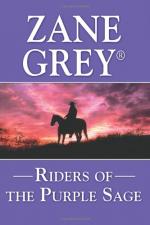“I’ll come if I live.”
“But—but you mightn’t come?”
“That’s possible, of course. It’ll take a good deal to kill me. A man couldn’t have a faster horse or keener dog. And, Bess, I’ve guns, and I’ll use them if I’m pushed. But don’t worry.”
“I’ve faith in you. I’ll not worry until after four days. Only— because you mightn’t come—I must tell you—”
She lost her voice. Her pale face, her great, glowing, earnest eyes, seemed to stand alone out of the gloom of the gorge. The dog whined, breaking the silence.
“I must tell you—because you mightn’t come back,” she whispered. “You must know what—what I think of your goodness—of you. Always I’ve been tongue-tied. I seemed not to be grateful. It was deep in my heart. Even now—if I were other than I am—I couldn’t tell you. But I’m nothing—only a rustler’s girl—nameless—infamous. You’ve saved me— and I’m—I’m yours to do with as you like....With all my heart and soul—I love you!”
CHAPTER XV. SHADOWS ON THE SAGE-SLOPE
In the cloudy, threatening, waning summer days shadows lengthened down the sage-slope, and Jane Withersteen likened them to the shadows gathering and closing in around her life.
Mrs. Larkin died, and little Fay was left an orphan with no known relative. Jane’s love redoubled. It was the saving brightness of a darkening hour. Fay turned now to Jane in childish worship. And Jane at last found full expression for the mother-longing in her heart. Upon Lassiter, too, Mrs. Larkin’s death had some subtle reaction. Before, he had often, without explanation, advised Jane to send Fay back to any Gentile family that would take her in. Passionately and reproachfully and wonderingly Jane had refused even to entertain such an idea. And now Lassiter never advised it again, grew sadder and quieter in his contemplation of the child, and infinitely more gentle and loving. Sometimes Jane had a cold, inexplicable sensation of dread when she saw Lassiter watching Fay. What did the rider see in the future? Why did he, day by day, grow more silent, calmer, cooler, yet sadder in prophetic assurance of something to be?
No doubt, Jane thought, the rider, in his almost superhuman power of foresight, saw behind the horizon the dark, lengthening shadows that were soon to crowd and gloom over him and her and little Fay. Jane Withersteen awaited the long-deferred breaking of the storm with a courage and embittered calm that had come to her in her extremity. Hope had not died. Doubt and fear, subservient to her will, no longer gave her sleepless nights and tortured days. Love remained. All that she had loved she now loved the more. She seemed to feel that she was defiantly flinging the wealth of her love in the face of misfortune and of hate. No day passed but she prayed for all—and most fervently for her enemies. It troubled her that she had lost, or had never gained, the whole control of her mind. In some measure reason and wisdom and decision were locked in a chamber of her brain, awaiting a key. Power to think of some things was taken from her. Meanwhile, abiding a day of judgment, she fought ceaselessly to deny the bitter drops in her cup, to tear back the slow, the intangibly slow growth of a hot, corrosive lichen eating into her heart.




